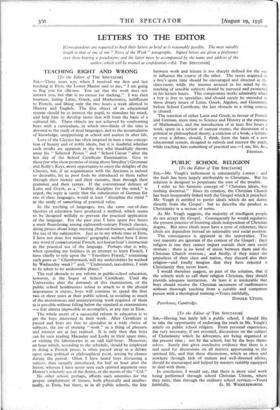TEACHING RIGHT AND WRONG
LETTERS TO THE EDITOR
(Correspondents are requested to keep their letters as brief as is reasonably possible. The most suitable length is that of one of our " News of the Week " paragraphs. Signed letters are given a preference over those bearing a pseudonym, and the latter must be accompanied by the name and address of the author, which will be treated as confidential.—Ed. THE SPECTATOR] [To the Editor of THE SPECTATOR] SIR,—Three years a3o, when I received my first and last birching at Eton, the Lower Master said to me, " I am going to flog you for idleness. You say that the work does not interest you, but that is no excuse for slacking." - I was then fourteen, hating Latin, Greek, and Mathematics, indifferent to French, and liking only the two hours a week allotted to History and English. The first object of an educational system should be to interest the pupil, to stimulate his mind, and help him to develop tastes that will form the basis of a cultured life. These objects are not achieved by confronting boys with a curriculum, in which two-thirds of the time is devoted to th6 study of dead languages, and to the accumulation of knowledge, unappetising at school and useless in after life.
Love of the Classics has often inspired in men a true concep- tion of beauty and of noble ideals, but it is doubtful whether such results are apparent' in the boy who thankfully throws away his " Selected Proses " and " School Caesar " after the last day of the School Certificate Examination. Give to those few who show promise of rising above Smedley's Grammar , and Kelly's Keys, every opportunity to enjoy the delights of the Classics, but, if an acquaintance with the Ancients is indeed so desirable, let us poor fools be introduced to them rather through their history and their customs, than through their grammar and their syntax. If the conventional defence of Latin and Greek, as a " healthy discipline for the mind," is urged, the reply is surely that the substitution of German for one of these languages, would at least " discipline the mind " in the study of something of practical value.
In the teaching of languages, too, the same out-of-date theories of education have produced a method, which seems to be 'designed wilfully to prevent the practical application of the language. For the past year I have spent five hours a week floundering among eighteenth-century French classics, doing proses about kings meeting charcoal-burners, and cursing the use of the subjunctive. Just as in my whole time at Eton, I have not done five minutes' geography, neither have I done one word of conversational French, nor had an hour's instruction in the practical use of the language. Perhaps ' that is why, when spending my holidays in an attempt to learn French, I have chiefly to rely upon the " Travellers Friend," containing such gems as " Chambermaid, will my underclothes be washed by Wednesday week ? " and, " Understand; taxi-driver, I wish to be taken to no undesirable places."
The real obstacle to any reform in public-school' education, however, is the bogey of School Certificate. Until the Universities alter the demands of this examination, or the public school headmasters refuse to attach to it the absurd importance it enjoys, boys will continue to spend the first two or three years at their public school, in avoiding as much of the monotonous and unenterprising work required of them as is possible without falling below the standard at examinations —a feat almost impossible to accomplish, at any rate at Eton.
The whole secret of a successful reform hi education is to get the boys interested in their work: After Certificate is passed and boys are free to specialise in a wide choice of subjects, the joy of treating " work " as a thing of pleasure and interest are at last realised. It is only- then that boys can be seen reading Macaulay and Lecky in their spare time, or visiting the laboratories in an odd half-hour: Moreover, an hour which, according to the schedule, should be employed in doing a French prose, is often passed away in a debate upon some political or philosophical point, arising by chance during the period. Often I have heard boys discussing a subject, thus casually introduced, for half an hour after the lesson, whereas I have never seen such spirited argument over Homer's scholarly use of the Aorist, or the merits of the " Cid."
No other school, perhaps, affords such amenities for the proper employment of leisure, both physically and intellec- tually, as Eton, but there, as in all public schools, the line
between work and leisure is too sharply defined for the one to influence the course of the other. The tastes acquired in a boy's spare time should be encouraged and directed in the class-room, while the interest aroused in his mind by the teaching of sensible subjects should be pursued and promoted in his leisure hours. This compromise works admirably when a boy is free to specialise, and should surely be extended to thosee -dreary hourS of Latin, Greek, Algebra, and Geometry, before School Certificate, the last obstacle in a tiring course, is cleared. - The rejection of either Latin and Greek, in favour of French and German, more time to Science and History at the expense " of Mathematics, and the introduction of at least five hours a week, spent in a review of current events, the discussion of a politiCal or philosophical theory, a criticism of a book, a lecture, or even a debate, should, I think, form the basis of a new educational system, designed to refresh and interest the pupil, while teaching him something of practical use.—I am, Sir, &c.,
ETONIAN.






































 Previous page
Previous page